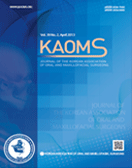Journal of the Korean Association of Oral and Maxillofacial Surgeons
- P-ISSN2234-7550
- E-ISSN2234-5930
- SCOPUS, KCI, ESCI
 ISSN : 2234-7550
ISSN : 2234-7550
구강 편평세포암에서 E-cadherin 유전자의 과메틸화
The hypermethylation of E-cadherin gene in oral squamous cell carcinoma
김영실 (제주대학교)
박지영 (가톨릭대학교)
김창현 (가톨릭대학교)
이원 (가톨릭대학교)
박민규 (가톨릭대학교)
Abstract
Loss of E-cadherin (E-cad) expression has been found in multiple cancers and is postulated to facilitate tumor cell dissociation and metastais. Promotor methylation may provides an alternative pathway for loss of gene function. This study evaluated the role of hypermethylation in the down-regulation of E-cad in oral squamous cell carcinoma (OSCC). We examined the E-cad expression by immunohistochemical staining and detected methylation status by methylation-specific polymerase chain reaction (MSP) in 20 OSCC tissues. Overally, 12 (60%) cases of hypermethylation of E-cad were detected and we found there were no correlation between methylation and age, histologic grade, lympn node metastasis, tumor size and clinical stage. However, Eleven (73.3%) of 15 samples which was negative for E-cad staining showed hypermethylation of E-cad promotor region. On the other hand, only one (20%) of 5 E-cad positive sample was observed with methylated status. The underexpression of E-cad was found to be related to promotor hypermethylation (p=0.035). In conclusion, we suggest that hypermethylation play a role in inactivation of E-cad gene and may be a appreciable biomarker for diagnosis and treatment of OSCC.
- keywords
- Oral squamous cell carcinoma, E-cadherin, Hypermethylation, Methylation-specific PCR
- 다운로드 수
- 조회수
- 0KCI 피인용수
- 0WOS 피인용수